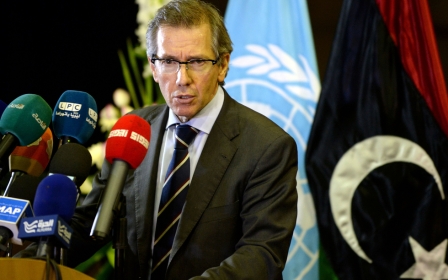US, European leaders urge Libya rivals to sign peace deal

The United States and major European powers joined other world leaders on Friday in urging Libya's warring parties to sign a proposed peace deal to create a national unity government.
“This outcome represents an important achievement in the joint effort to reach a representative and fair settlement to support Libya’s successful transition towards a sovereign, peaceful and stable democracy," six countries said in a joint statement.
"The senior leaders of the Government of National Accord, listed in Annex 1 of the final framework text, will have the vital responsibility of overseeing this transition and providing Libyans with the stable, inclusive government their country needs," the statement said, signed by Britain, France, Germany, Italy, Spain and the United States.
"There is no more time to waste … delays in forming a unity government will only prolong the suffering of the Libyan people and benefit terrorists seeking to take advantage of the chaos," the statement continued.
The governments gave their "full support" to the text of the agreement and to the leaders who would make up the new unity government under the accord.
The new government would be headed by Fayez el-Sarraj, a deputy in the Tripoli parliament, and include three deputy prime ministers, one each from the west, east and south of the country.
It would seek to end the political turmoil that has existed since August 2014, when a militia alliance that includes Islamists overran Tripoli, forcing the internationally recognised government to take refuge in the east and creating a second national administration.
The proposed deal was put forward by UN envoy Bernardino Leon following what the Western powers called "prolonged and difficult negotiations".
After four years of conflict, many Western powers fear that further discord would result in the oil-rich country becoming a failed state.
UN Secretary-General Ban Ki-moon also appealed to Libyan leaders to sign the accord, as did EU officials.
But an MP of the Tripoli-based General National Congress, Abdulsalam Bilashahir, told the BBC in response to the unity government proposal: "We are not a part of this government. It means nothing to us and we were not consulted."
And Ibrahim Alzaghiat, of the internationally recognised House of Representatives (HoR) parliament based in Tobruk, said: "This proposed government will lead to the division of Libya and will turn it into a joke. Mr Leon's choice was unwise."
Stay informed with MEE's newsletters
Sign up to get the latest alerts, insights and analysis, starting with Turkey Unpacked
Middle East Eye delivers independent and unrivalled coverage and analysis of the Middle East, North Africa and beyond. To learn more about republishing this content and the associated fees, please fill out this form. More about MEE can be found here.




